 Hamlet’s famous soliloquy‚ from William Shakespeare’s synonymous play‚ starting with the memorable phrase “To be or not to be‚ that is the question”‚ is a reflection that profoundly resonates with the Eastern Orthodox theology. Let me explain this.
Hamlet’s famous soliloquy‚ from William Shakespeare’s synonymous play‚ starting with the memorable phrase “To be or not to be‚ that is the question”‚ is a reflection that profoundly resonates with the Eastern Orthodox theology. Let me explain this.
Since Scholastics‚ Renaissance‚ Reformation and Modern age the Western civilization has based and measured its success on reason. Through reason one understands the world around‚ through the daughter of reason‚ science‚ technology advances and improves life‚ through reason one even dares to demonstrate God’s existence and explain the mysteries of faith.
Reason demands “to know”; for reason is not enough “to be”‚ because it should also answer all the questions about “how?”‚ why?”‚ “when? “‚ “how long” etc. Reason demands that everything sits in a logical order; everything should make sense and have an explanation. Reason is a curious cat that does not let you sleep until you feed her with what its heart desires: knowledge.
Unfortunately our obsession with knowledge can ruin everything from an existential perspective. From childhood we are trained to accumulate knowledge about everything‚ but after a lifetime spent in school we often find ourselves in a place where we realize that we actually don’t know anything and by obsessively searching for answers about our lives we forgot to live.
In the Gospel of Mark Jesus gives a warning: “Truly I say to you‚ whoever shall not receive the kingdom of God as a little child‚ he shall not enter into it.” (Mar 10:15). This is not only about being pure and sinless like a child‚ there is much more to it.
A baby loves the presence of his mom not because he knows about her: where she was born‚ how old is she‚ or what her principles of parenting are; a baby will only love his mom because she is there and loves him unconditionally. The signs of her presence‚ her smell‚ her tender arms and her affection are enough for him to instantly feel good. None of the biographical info about his mom will make him love her more or less‚ the fact that she “is” is the only important reality about her.
The same is true for our spiritual life. We consider ourselves knowledgeable adults that understand life but actually in front of God we are all like little children. We ask all these existential questions but we don’t understand the language of God‚ we cannot speak “heaven”. But we keep trying in an endless and fruitless hope that one day we will get it. This is nothing but wasted energy. Instead of spending all the effort in rattling our intellectual cage to crack “God’s code”‚ we should just learn “to be” in His presence and receive the love He so graciously offers us.
God shares His presence with us through the Sacraments of the Church. The Greek “original” word for “sacrament” is “mysterion”‚ which transmits much better the Orthodox attitude toward the works of God in the world. During a sacrament‚ let’s say Holy Unction‚ there is more than just an automatic consecration/sanctification of the oil‚ it is a whole “mystery” that unfolds involving faith‚ will and the God’s grace. A “mysterion” is in fact a mystery that doesn’t need to be solved‚ because the mind‚ in its current fallen state cannot understand it anyway; suffices to know that that a “mysterion” is God at work for our salvation.
This is the very essence of the hesychastic prayer‚ the Eastern Orthodox mystical approach to knowing God. Hesychasm concentrates not on theology but on prayer‚ a prayer of peace‚ without form‚ without imagination in which God can reveal Himself as He IS not as we want Him to be. In the silent prayer the deafening chatter of our mind’s struggle is shut-up and in that silence we can start hearing God for the first time.
The answer one receives in prayer to all the existential questions is that “to be” with God is the same as “to know” God. Knowing God is not a theoretical event but an experience that has to be lived for one to understand. Knowing God is to be in His presence‚ to be saturated by His love‚ to simply be in awe‚ facing in stillness the mystery of God.
“To be” or “to know”‚ that is the question‚